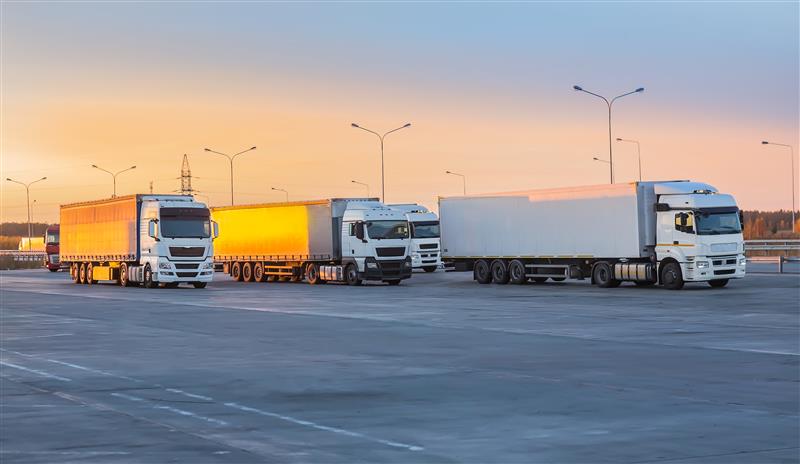
Guest
Os camiões podem circular aos domingos na Europa?
Criado: 23/12/2024
•
Atualizado: 23/12/2024
Navegar pelas proibições de condução de camiões aos domingos em toda a Europa requer uma compreensão abrangente dos regulamentos específicos de cada país, variações sazonais e estratégias eficazes. Ao investirem num planeamento exaustivo das rotas, ao manterem-se informadas, ao optimizarem as operações e ao tirarem partido da tecnologia, as empresas de frotas podem atenuar o impacto destas restrições.
Neste blogue, exploramos as diferentes regras em vários países europeus e aprofundamos as melhores formas de nos adaptarmos a elas.
Regulamentos específicos de cada país
Cada país tem a sua própria legislação sobre a proibição de conduzir ao domingo, que pode variar muito.
Alemanha
Das 12h00 às 22h00 do último dia da semana, os camiões com mais de 7,5 toneladas não podem circular. No entanto, isto não é necessariamente um impedimento. As operações de transporte combinado podem beneficiar de subsídios especiais, sendo permitido o transporte ferroviário e rodoviário num raio de 200 quilómetros das estações de carga ou descarga, e o transporte portuário ou rodoviário num raio de 150 quilómetros dos portos. O transporte de mercadorias perecíveis específicas também está isento, como o leite fresco, os produtos lácteos, a carne, o peixe, a fruta e os legumes.
Além disso, determinados veículos e operações não estão sujeitos à proibição, como os veículos de emergência envolvidos em serviços de recuperação, reboque ou desempanagem.
França
Neste território, as restrições de circulação são semelhantes às da Alemanha, aplicando-se aos camiões com mais de 7,5 toneladas. Estes embargos ocorrem aos domingos e feriados, das 12 às 22 horas.
Para além disso, existem restrições aos sábados e na véspera dos feriados nacionais, com proibição de circulação das 22h00 às 24h00. E durante o verão, há sábados específicos em que é proibido conduzir das 7h às 19h.
Existem excepções para certas mercadorias, incluindo produtos lácteos e carne, bem como veículos de emergência. A violação destas proibições pode dar origem a coimas significativas, que variam entre 750 e 3 750 euros para pessoas singulares e colectivas, respetivamente.
Itália
Em Itália, os camiões não podem circular nas estradas aos domingos e feriados, das 9 às 22 horas. Vale a pena notar que, em junho, julho, agosto e setembro, o embargo começa mais cedo, às 7 horas da manhã, embora continue a terminar às 22 horas.
O país também impõe restrições adicionais durante os meses de verão. Em julho, há um embargo aos sábados, das 8 às 16 horas, que se prolonga das 8 às 22 horas em agosto.
Embora estas sejam as regras gerais, é fundamental saber que podem existir variações locais ou restrições temporárias em determinados itinerários. Tal como acontece com a França e a Alemanha, também se podem aplicar algumas excepções para tipos específicos de mercadorias ou serviços de emergência.
Espanha
Quanto a Espanha, o cenário é muito mais complexo. Existe uma manta de retalhos de proibições regionais, particularmente na Catalunha. As restrições de condução para camiões podem mudar com base em regulamentos locais, feriados e rotas específicas. Os camionistas que operam aqui devem consultar as diretrizes locais para garantir a conformidade.
Para além das injunções aos domingos e feriados, existem também limitações em determinados sábados durante os meses de verão. Estas aplicam-se geralmente das 8h00 às 12h00, sobretudo em julho e agosto, quando o tráfego é mais intenso devido aos veraneantes.
Outros países
No que diz respeito a outras nações europeias, há muitas que também aplicam as suas próprias proibições de condução ao domingo. A Áustria, por exemplo, determina que os camiões com peso superior a 7,5 toneladas não podem circular nas estradas aos domingos, entre as 12 e as 22 horas. A Suíça mantém algo semelhante, com os veículos com mais de 3,5 toneladas a não poderem circular durante todo o dia.

Estratégias para empresas de frotas
Para navegar pelas restrições de condução de camiões no domingo, é crucial um planeamento eficaz das rotas. Ao utilizar tecnologia avançada e pensamento estratégico, os operadores de frotas podem otimizar os seus processos.
Utilizar GPS e software de planeamento de itinerários
A utilização de sistemas GPS modernos e de [software de planeamento de rotas] (https://snapacc.com/newsroom/route-optimisation-with-fleet-management-software-snap-account/) permite que as frotas e os seus condutores identifiquem as viagens mais eficientes, evitando áreas com proibições de condução. Estas ferramentas podem fornecer actualizações em tempo real sobre as condições da estrada, assegurando que os camionistas podem tomar decisões informadas em movimento.
Considerar caminhos alternativos
Outra ideia é explorar diferentes formas de chegar ao local em questão. Embora possa ser tentador seguir o caminho mais direto, as rotas alternativas podem muitas vezes poupar tempo e evitar potenciais multas. Esses desvios podem ser um pouco mais longos, mas podem ajudar a contornar áreas com embargos rigorosos, permitindo operações mais tranquilas.
Planear para atrasos
Dada a possibilidade de contratempos causados por congestionamento de tráfego ou embargos de condução, também é aconselhável que as empresas de frotas incluam tempo adicional nos seus horários. Uma abordagem proactiva proporciona uma melhor oportunidade para que as entregas se mantenham atempadas, mesmo perante desafios inesperados.
Manter-se informado
Manter-se atualizado sobre os regulamentos e as condições de tráfego em tempo real é igualmente crucial. É por isso que é aconselhável utilizar aplicações e websites específicos - estes fornecem aos camionistas actualizações em tempo real sobre encerramentos de estradas, acidentes e congestionamentos, permitindo-lhes fazer ajustes nas rotas e evitar quaisquer atrasos.
Muitas associações de transportes e fornecedores de logística oferecem serviços de subscrição de alertas de trânsito. Ao subscreverem estas notificações, os operadores de frotas podem receber informações sobre quaisquer alterações às regras de condução, garantindo o seu cumprimento.
Tirar partido da tecnologia
A utilização da tecnologia pode melhorar a eficiência operacional e o cumprimento dos [regulamentos relativos ao tempo de condução] (https://snapacc.com/newsroom/drivers-working-time-directive-a-guide-for-truck-drivers/).
Os sistemas telemáticos permitem às empresas de frotas monitorizar a localização dos veículos, o consumo de combustível e o comportamento dos condutores. Os dados podem ser valiosos para otimizar as rotas. Além disso, a manutenção de diários de bordo digitais simplifica a manutenção de registos, o que fornecerá documentação essencial em caso de auditoria.
Igualmente importante é a tecnologia para simplificar os pagamentos - e é aí que o SNAP pode ajudar.
Inscrever-se no SNAP
Quer esteja à procura de estacionamento seguro, lavagem de camiões ou outros serviços para as suas frotas, as nossas soluções tornam o pagamento dos mesmos muito mais conveniente. Veja o que a SNAP pode oferecer-lhe hoje.


